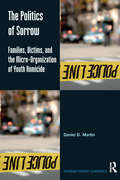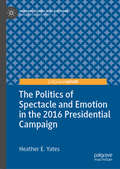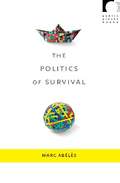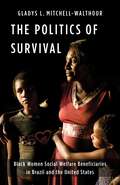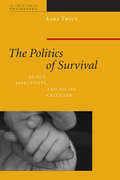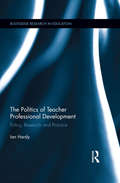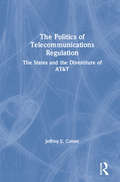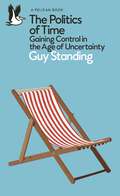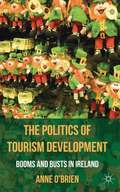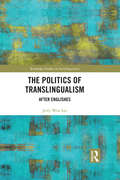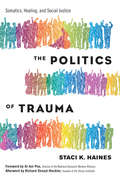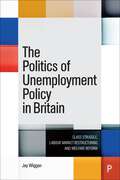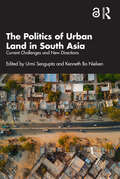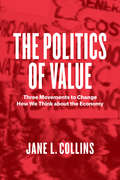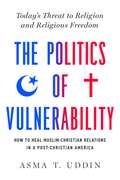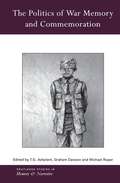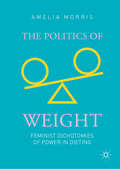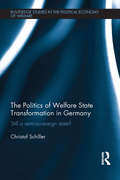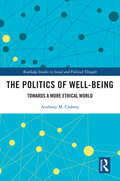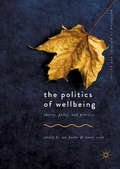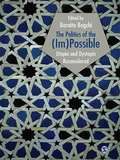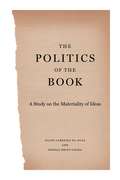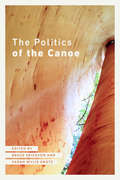- Table View
- List View
The Politics of Sorrow: Families, Victims, and the Micro-Organization of Youth Homicide (Interactionist Currents)
by Daniel D. MartinDrawing on several years of research with grief support organizations and the families and friends of murdered children, this book examines the emotional experience of families in the aftermath of a homicide. It examines the politics of sorrow, offering a comparative analysis of White and African-American families as they navigate the experience of homicide, shedding light on the ways in which the class location or ethnicity of mourners affects their experience. Analyzing the manner in which police and other authorities differentially extend emotional support to bereaved families, notify them of a homicide, or assign blame, The Politics of Sorrow reveals how 'disenfranchised grief' comes to be an institutionalized outcome of their practice. The book further examines the effects of 'announcement shock' and the importance to the family of the moral career of the deceased, as they seek to manage his or her identity, often dealing with their grief through an active pursuit of justice in court, or through political involvement with a grief support organization, which mobilizes families in pursuit of its political ends. A rigorous study of stigma, identity, and stratified experiences of grief, The Politics of Sorrow will appeal to sociologists interested in interactionist methods, race, class, and emotion.
The Politics of Spectacle and Emotion in the 2016 Presidential Campaign (Palgrave Studies in US Elections)
by Heather E. YatesThis book examines the highly emotional context of the 2016 US presidential campaign through the scope of political theater and emotional attribution. It takes inventory of the political landscape that defined the campaign and advances the argument that the campaign’s high intensity generated a more interest-attentive citizenry and became an exercise in political theater. A framework operationalizing the components of political spectacle anchors the analysis treating emotions, affect transfer and the rise of negative partisanship. The analytical scope is focused specifically on voters’ emotional responses toward Donald Trump and Hillary Clinton and empirically demonstrates the effects of discrete feelings on five emotional dimensions including pride, hope, fear, anger, and disgust on attitudes about issues ranging from the economy to immigration to the 2016 Supreme Court vacancy. Anchored in the Affective Intelligence Theory and affect transfer, the findings lend support to the principles of negative partisanship that characterized the 2016 presidential contest.
The Politics of Survival
by Marc AbélésIn this provocative analysis of global politics, the anthropologist Marc Abls argues that the meaning and aims of political action have radically changed in the era of globalization. As dangers such as terrorism and global warming have moved to the fore of global consciousness, foreboding has replaced the belief that tomorrow will be better than today. Survival, outlasting the uncertainties and threats of a precarious future, has supplanted harmonious coexistence as the primary goal of politics. Abls contends that this political reorientation has changed our priorities and modes of political action, and generated new debates and initiatives. The proliferation of supranational and transnational organizations--from the European Union to the World Trade Organization (WTO) to Oxfam--is the visible effect of this radical transformation in our relationship to the political realm. Areas of governance as diverse as the economy, the environment, and human rights have been partially taken over by such agencies. Non-governmental organizations in particular have become linked with the mindset of risk and uncertainty; they both reflect and help produce the politics of survival. Abls examines the new global politics, which assumes many forms and is enacted by diverse figures with varied sympathies: the officials at meetings of the WTO and the demonstrators outside them, celebrity activists, and online contributors to international charities. He makes an impassioned case that our accounts of globalization need to reckon with the preoccupations and affiliations now driving global politics. The Politics of Survival was first published in France in 2006. This English-language edition has been revised and includes a new preface.
The Politics of Survival: Black Women Social Welfare Beneficiaries in Brazil and the United States (Black Lives in the Diaspora: Past / Present / Future)
by Gladys L. Mitchell-WalthourPoor Black women who benefit from social welfare are marginalized in a number of ways by interlocking systemic racism, sexism, and classism. The media renders them invisible or casts them as racialized and undeserving “welfare queens” who exploit social safety nets. Even when Black women voters are celebrated, the voices of the poorest too often go unheard. How do Afro-descendant women in former slave-holding societies survive amid multifaceted oppression?Gladys L. Mitchell-Walthour offers a comparative analysis of how Black women social welfare beneficiaries in Brazil and the United States defy systems of domination. She argues that poor Black women act as political subjects in the struggle to survive, to provide food for their children and themselves, and challenge daily discrimination even in dire circumstances. Mitchell-Walthour examines the effects of social welfare programs, showing that mutual aid networks and informal labor also play important roles in beneficiaries’ lives. She also details how Afro-descendant women perceive stereotypes and discrimination based on race, class, gender, and skin color. Mitchell-Walthour considers their formal political participation, demonstrating that low-income Black women support progressive politics and that religious affiliation does not lead to conservative attitudes.Drawing on Black feminist frameworks, The Politics of Survival confronts the persistent invisibility of poor Black women by foregrounding their experiences and voices. Providing a wealth of empirical evidence on these women’s views and survival strategies, this book not only highlights how systemic structures marginalize them but also offers insight into how they resist such forces.
The Politics of Survival: Peirce, Affectivity, and Social Criticism (American Philosophy)
by Lara TroutHow can sincere, well-meaning people unintentionally perpetuate discrimination based on race, sex, sexuality, or other socio-political factors? To address this question, Lara Trout engages a neglected dimension of Charles S. Peirce's philosophy - human embodiment - in order to highlight the compatibility between Peirce's ideas and contemporary work in social criticism. This compatibility, which has been neglected in both Peircean and social criticism scholarship, emerges when the body is fore-grounded among the affective dimensions of Peirce's philosophy (including feeling, emotion, belief, doubt, instinct, and habit). Trout explains unintentional discrimination by situating Peircean affectivity within a post-Darwinian context, using the work of contemporary neuroscientist Antonio Damasio to facilitate this contextual move. Since children are vulnerable, naïve, and dependent upon their caretakers for survival, they must trust their caretaker's testimony about reality. This dependency, coupled with societal norms that reinforce historically dominant perspectives (such as being heterosexual, male, middle-class, and/or white), fosters the internalization of discriminatory habits that function non-consciously in adulthood. The Politics of Survival brings Peirce and social criticism into conversation. On the one hand, Peircean cognition, epistemology, phenomenology, and metaphysics dovetail with social critical insights into the inter-relationships among body and mind, emotion and reason, self and society. Moreover, Peirce's epistemological ideal of an infinitely inclusive community of inquiry into knowledge and reality implies a repudiation of exclusionary prejudice. On the other hand, work in feminism and race theory illustrates how the application of Peirce's infinitely inclusive communal ideal can be undermined by non-conscious habits of exclusion internalized in childhood by members belonging to historically dominant groups, such as the economically privileged, heterosexuals, men, and whites. Trout offers a Peircean response to this application problem that both acknowledges the "blind spots" of non-conscious discrimination and recommends a communally situated network of remedies including agapic love, critical common-sensism, scientific method, and self-control.
The Politics of Teacher Professional Development: Policy, Research and Practice (Routledge Research in Education #80)
by Ian HardyThe Politics of Teacher Professional Development: Policy, Research and Practice provides innovative insights into teachers’ continuing development and learning in contemporary western contexts. Rather than providing a list of "how-tos" and "must dos," this volume is premised on the understanding that by learning more about the current conditions under which teachers and other educators work and learn, it is possible to understand, and consequently improve, the learning opportunities teachers experience. Teacher professional development is not simply construed as an isolated series of events, such as day-long workshops marking the beginning of each school year or term, or individualistic "one-off" activities focused on new teaching approaches, curricula or assessment strategies. Rather, through application of sociologist Pierre Bourdieu’s understanding of social practices as contested, teacher professional development is revealed as a complex social practice which exists as policy, as a research product and process, and as an important part of teachers’ work. The book reveals how PD as policy, research and teachers’ work are inherently contested. An extended series of case studies of teacher professional development practices from Canada, England and Australia are employed to show how these tensions play out in complex ways in policy and practice.
The Politics of Telecommunications Regulation: The States and the Divestiture of AT&T
by Jeffrey E. CohenOriginally published in 1992. This text is a work from a series entitled ' Bureaucracies, Public Administration and Public Policy. The Politics of Telecommunication regulation: The States and the Divestiture of AT&T is an example of high-quality policy analysis conducted at state level. It substitutes for simple theories of public policy more complex and interesting explanations and relies on massive and time-consuming data-gathering that gives careful attention to measurement issues, providing a sophisticated empirical analysis to evaluate the utility of public policy theories.
The Politics of Time: Gaining Control in the Age of Uncertainty (Pelican Books)
by Guy Standing'Guy Standing's books have, over the years, pieced together a necessary political and intellectual agenda ... His Politics of Time is a splendid and timely addition to this body of important work' Yanis VaroufakisTime has always been political. Throughout history, how we use our time has been defined and controlled by the powerful, and today is no exception. But we can reclaim control, and in this book, the pioneering economist Guy Standing shows us how.The ancient Greeks organised time into five categories: work, labour, recreation, leisure and contemplation. Labour was onerous, whereas leisure was schole, and included participation in public life and lifelong education. Since the industrial revolution, our time has been shaped by capitalism, our jobs are supposed to provide all meaning in life, our time outside labour is considered simply 'time off', and politicians prioritise jobs above all other aspects of a good life.Today, we are experiencing the age of chronic uncertainty. Mental illness is on the rise, some people are experiencing more time freedom while many others are having more and more of their time stolen from them, particularly the vulnerable and those in the precariat.But there is a way forward. We can create a new politics of time, one that liberates us and helps save the planet, through strengthening real leisure and working together through commoning. We can retake control of our time, but we must do it together.
The Politics of Tourism Development: Booms and Busts in Ireland
by Anne O’BrienMoving beyond both tourism and politics literatures' current understandings of how tourism is developed, this book offers an original theory of interlocking regimes to account for the manner in which public and private bodies either facilitate or prevent development within tourism.
The Politics of Translingualism: After Englishes (Routledge Studies in Sociolinguistics)
by Jerry Won LeeTranslingualism refers to an orientation in scholarship that recognizes the fluidity of language boundaries and endorses a greater tolerance for the plurality of Englishes worldwide. However, it is possible that translingualism exacerbates the very problems it seeks to redress? This book seeks to destabilize underlying attitudes inherent in the narrowly conceptualized view of Englishes by pushing forward current theories of translingualism and integrating cutting-edge scholarship from sociolinguistics, critical theory, and composition studies. The Politics of Translingualism pays particular attention to the politics of evaluating language, including different Englishes, at a moment of unprecedented linguistic plurality worldwide. The book draws on analyses of a wide range of artifacts, from television commercials, social media comments, contemporary and canonical poetry, contemporary and historical English phrasebooks, commercial shop signs, and the writing of multilingual university students. The volume also looks outside the classroom, featuring interviews with recruiters in a number of professional fields to examine the ways in which language ideologies about Englishes can impact students entering the workforce. This book offers an innovative take on current debates on multilingualism and global Englishes, serving as an ideal resource for students and scholars in applied linguistics, sociolinguistics, composition studies, education, and cultural studies.
The Politics of Trauma: Somatics, Healing, and Social Justice
by Staci HainesAn essential tool for healers, therapists, activists, and survivors of trauma who are interested in a justice-centered approach to somatic transformationThe Politics of Trauma offers somatics with a social analysis. This book is for therapists and social activists who understand that trauma healing is not just for individuals--and that social change is not just for movement builders. Just as health practitioners need to consider the societal factors underlying trauma, so too must activists understand the physical and mental impacts of trauma on their own lives and the lives of the communities with whom they organize. Trauma healing and social change are, at their best, interdependent. Somatics has proven to be particularly effective in addressing trauma, but in practice it typically focuses solely on the individual, failing to integrate the social conditions that create trauma in the first place. Staci K. Haines, somatic innovator and cofounder of generative somatics, invites readers to look beyond individual experiences of body and mind to examine the social, political, and economic roots of trauma--including racism, environmental degradation, sexism, and poverty. Haines helps readers identify, understand, and address these sources of trauma to help us bridge individual healing with social transformation.
The Politics of Unemployment Policy in Britain: Class Struggle, Labour Market Restructuring and Welfare Reform
by Jay WigganThis book provides an account of the evolution of social security and employment policy and governance in Britain between 1973 and 2023. It explains how this remaking of policy and governance shaped, and was shaped by, the transformation of the labour market and power of claimants and workers. Advancing a class-centred explanation, the text situates contemporary working age active labour market policy as the contingent outcome of a long struggle over curtailment of labour autonomy and the challenges arising from policy ‘success’ for securing social cohesion, state legitimacy and better economic conditions for growth.
The Politics of Urban Land in South Asia: Current Challenges and New Directions (Cities and the Urban Imperative)
by Kenneth Bo Nielsen Urmi SenguptaCities in South Asia are homes to one of the highest concentrations of people anywhere in the world and the allocation of land and urban resources and the benefits that can be derived from them in this region have become increasingly contested. This book explores the politics of urban land in South Asia and the challenges related to their respective urban futures.For most people, land comes at a premium, and as a result conflicts and contestations over land and urban resources are rife in countries such as India, Bangladesh, Pakistan, Sri Lanka and Nepal, as witnessed in the many struggles of low-income groups and vulnerable or marginalised communities to fight off dispossession or displacement. This book maps current challenges shared across national borders and charts out new directions for future research and land policy. With contributions from emerging and established authors, the book offers a critical accounting of the situation that exists in urban South Asia, while also critically engaging with the current challenges and future directions for land use and land politics.The book will be useful to students and researchers of public policy, development studies, economics, urban and regional development studies, and sociology as well as to policy makers, real estate professionals, and commercial firms engaged in property market/real estate study in Asia.Chapter 10 of this book is freely available as a downloadable Open Access PDF at http://www.taylorfrancis.com under a Creative Commons [Attribution-Non Commercial-No Derivatives CC-BY-NC-ND 4.0 license.
The Politics of Value: Three Movements to Change How We Think about the Economy
by Jane L. CollinsThe Great Recession not only shook Americans’ economic faith but also prompted powerful critiques of economic institutions. This timely book explores three movements that gathered force after 2008: the rise of the benefit corporation, which requires social responsibility and eschews share price as the best metric for success; the emergence of a new group, Slow Money, that fosters peer-to-peer investing; and the 2011 Wisconsin protests against a bill restricting the union rights of state workers. Each case shows how the concrete actions of a group of citizens can prompt us to reflect on what is needed for a just and sustainable economic system. In one case, activists raised questions about the responsibilities of business, in the second about the significance of local economies, and in the third about the contributions of the public sector. Through these movements, Jane L. Collins maps a set of cultural conversations about the types of investments and activities that contribute to the health of the economy. Compelling and persuasive, The Politics of Value offers a new framework for viewing economic value, one grounded in thoughtful assessment of the social division of labor and the relationship of the state and the market to civil society.
The Politics of Vulnerability: How to Heal Muslim-Christian Relations in a Post-Christian America: Today's Threat to Religion and Religious Freedom
by Asma T. UddinA religious liberty lawyer and acclaimed author reveals the root of America's polarization inside the Muslim and evangelical Christian divide—and how it can be healed.Despite the dire consequences of America's cultural, political, and religious divisiveness, from increasing incivility to discrimination and outright violence, few have been able to get to the core cause of this conflict. Even fewer have offered measures for reconcilliation. Now, in The Politics of Vulnerability, Asma Uddin, American-Muslim public intellectual, religious-liberties attorney, and activist, provides a unique perspective on the complex political and social factors contributing to the Muslim-Christian divide. Unlike other analysts, Uddin asks what underlying drivers cause otherwise good people to do—or believe—bad things? Why do people who value faith support of measures that limit others, especially of Muslims&’, religious freedom and other rights?&’ Uddin humanizes a contentious relationship by fully embracing both sides as individuals driven by very human fears and anxieties. Many conservative Christians fear that the Left is dismantling traditional &“Christian America&” to replace it with an Islamized America, a conspiratorial theory that has given rise to an &“evangelical persecution complex,&” a politicized vulnerability. Uddin reveals that Islamophobia and other aspects of the conservative Christian movement are interconnected. Where does hate come from and how can it be conquered? Only by addressing the underlying factors of this politics of vulnerability can we begin to heal the divide.
The Politics of War Memory and Commemoration
by T. G. Ashplant Graham Dawson Michael RoperWar memory and commemoration have had increasingly high profiles in public and academic debates in recent years. This volume examines some of the social changes which have led to this development, among them the passing of the two World Wars from survivor into cultural memory. Focusing on the politics of war memory and commemoration, the book illuminates the struggle to install particular memories at the centre of a cultural world, and offers an extensive argument about how the politics of commemoration practices should be understood.
The Politics of Weight: Feminist Dichotomies of Power in Dieting
by Amelia MorrisThis book speaks to the politics of weight through an interrogation of dieting, power and the body. In feminist theory, there is no greater site of contestation than that of the body, and Morris explores how these debates often become centred upon a dichotomy between oppression and liberation. Whilst there is a vast diversity of scholarship that challenges this binary including post-colonial, post-structuralist and Marxist feminist work, the dichotomy nevertheless endures. The Politics of Weight argues that the ‘feminine’ body is not simply a site of oppression or liberation by drawing upon the intersections that exist between Foucault’s Discipline and Punish and post-structuralist feminist work on the body. This provides a unique lens for exploring weight. Through in-depth analysis of interviews with women who seemingly sit on either side of the ‘oppression’ and ‘liberation’ debate, members of dieting clubs and fat activists, the book highlights the complexities that surround women’s relationship to weight and the body. Likewise it draws upon the wealth of black feminist scholarship to explore the discourses surrounding Oprah Winfrey’s dieting ‘journey,’ seeking to demonstrate how discipline and race interact and how this plays out in dieting and weight. The Politics of Weight will be of interest to students and scholars across a range of disciplines, including gender studies, sociology, geography and political science.
The Politics of Welfare State Transformation in Germany: Still a Semi-Sovereign State? (Routledge Studies in the Political Economy of the Welfare State)
by Christof SchillerHow can we best analyse contemporary welfare state change? And how can we explain and understand the politics of it? This book contributes to these questions both empirically and theoretically by concentrating on one of the least likely cases for welfare state transformation in Europe. It analyzes in detail how and why institutional change has taken Germany’s welfare state from a conservative towards a new work-first regime. Christof Schiller introduces a novel analytical framework to make sense of the politics of welfare state transformation by providing the missing link: the capacity of the core executive over time. Examining the policy making process in labour market policy in the period between 1980 and 2010, he identifies three different policy making episodes and analyses their interaction with developments and changes in such policy areas as pension policy, family policy, labour law, tax policy and social assistance. The book advances existing efforts aimed at conceptualizing and measuring welfare state change by proposing a clear-cut conceptualization of social policy regime change and introduces a comprehensive analysis of the transformation of the welfare-work nexus between 1980 and 2010 in Germany. This book will be of interest to students and scholars of social policy, comparative welfare state reform, welfare politics, government, governance, public policy, German politics, European politics, political economy, sociology and history.
The Politics of Well-Being: Towards a More Ethical World (Routledge Studies in Social and Political Thought)
by Anthony M. ClohesyThe Politics of Well-Being argues that the relationship between well-being and ethical life has been overlooked. The more specific argument of the book is that ethical life requires political engagement, and the emergence of a society committed to critical thinking. It is argued that these conditions allow for our ordination and confirmation as ethical subjects. While well-being can be experienced in different ways, it is claimed that, after experience of ethical life, a more sustainable form of it is revealed to us, a form which we would be drawn to preserve, a form which can be constituted as an object of hope. While the book draws on philosophical themes, its main focus is political. This is because its primary objective is to identify and to examine what needs to be done in order to realise ethical life. Its main focus in this respect is the identification and examination of the barriers which need to be overcome if ethical life is to be realised. It is acknowledged that this will not be an easy task. Indeed, it may be an impossible task. However, despite these barriers, and despite the dark days we are living through, the book is a call to hope rather than a surrender to despair. This book will be of interest to students of politics, psychology, cultural studies, philosophy and sociology, as well as anyone else interested in exploring new ideas about how the make the world a better place.
The Politics of Wellbeing: Understanding The Rise And Significance Of A New Agenda (Wellbeing In Politics And Policy Series)
by Karen Scott Ian BacheThis volume is the first collection in the field of wellbeing studies that places politics centre stage. Through a combination of intellectual inquiry, empirically-grounded research, and investigation across different settings, this book aims to provide fresh insights and develop new lenses through which to understand the rise and significance of the wellbeing agenda. Divided into three parts, it considers how to define wellbeing for public policy; the prospects for wellbeing as a force for political change; and the link between policy agendas and the everyday lives of people. The book explores the key political issues of power, democracy, and the legitimacy of wellbeing evidence in a range of settings – international, national and subnational/substate. The volume will appeal to wellbeing and politics scholars, as well as students and general readers with an interest in these new political agendas.
The Politics of Work–Family Policies
by Patricia BolingThe work-family policies of Sweden and France are often held up as models for other nations to follow, yet political structures and resources can present obstacles to fundamental change that must be taken into account. Patricia Boling argues that we need to think realistically about how to create political and policy change in this vital area. She evaluates policy approaches in the US, France, Germany and Japan, analyzing their policy histories, power resources, and political institutions to explain their approaches, and to propose realistic trajectories toward change. Arguing that much of the story lies in the way that job markets are structured, Boling shows that when women have reasonable chances of resuming their careers after giving birth, they are more likely to have children than in countries where even brief breaks put an end to a career, or where motherhood restricts them to part-time work.
The Politics of the (Im)Possible
by Barnita BagchiThis volume brings together articles on utopia and dystopia in a breadth of disciplines-history, literature, gender studies, political science, sociology, anthropology, and Native American Studies. Utopia and dystopia are modes and resonances present in all parts of the world, not just Europe and white North America. Equally, utopian and dystopian thought and practice are and have always been gendered. Utopia, memory and temporality often intersect in strange and surprising ways. Three dimensions are thus central to the enterprise undertaken in this volume: 1 The relationship between utopia/dystopia and time/memory 2 The focus on Europe and areas outside Europe at the same time 3 The gendered analysis of utopia/dystopia Contributors to this volume include prominent experts in fields as varied as Development Studies, Cultural Studies, Women's Studies and Literature.
The Politics of the Book: A Study on the Materiality of Ideas (Penn State Series in the History of the Book #30)
by Filipe Carreira da Silva Monica Brito VieiraIt is impossible to separate the content of a book from its form. In this study, Filipe Carreira da Silva and Mónica Brito Vieira expand our understanding of the history of social and political scholarship by examining how the entirety of a book mediates and constitutes meaning in ways that affect its substance, appropriation, and reception over time.Examining the evolving form of classic works of social and political thought, including W. E. B. Du Bois’s The Souls of Black Folk, G. H. Mead’s Mind, Self, and Society, and Karl Marx’s 1844 Economic and Philosophic Manuscripts, Carreira da Silva and Brito Vieira show that making these books involved many hands. They explore what publishers, editors, translators, and commentators accomplish by offering the reading public new versions of the works under consideration, examine debates about the intended meaning of the works and discussions over their present relevance, and elucidate the various ways in which content and material form are interwoven. In doing so, Carreira da Silva and Brito Vieira characterize the editorial process as a meaning-producing action involving both collaboration and an ongoing battle for the importance of the book form to a work’s disciplinary belonging, ideological positioning, and political significanceTheoretically sophisticated and thoroughly researched, The Politics of the Book radically changes our understanding of what doing social and political theory—and its history—implies. It will be welcomed by scholars of book history, the history of social and political thought, and social and political theory.
The Politics of the Book: A Study on the Materiality of Ideas (Penn State Series in the History of the Book)
by Filipe Carreira da Silva Monica Brito VieiraIt is impossible to separate the content of a book from its form. In this study, Filipe Carreira da Silva and Mónica Brito Vieira expand our understanding of the history of social and political scholarship by examining how the entirety of a book mediates and constitutes meaning in ways that affect its substance, appropriation, and reception over time.Examining the evolving form of classic works of social and political thought, including W. E. B. Du Bois’s The Souls of Black Folk, G. H. Mead’s Mind, Self, and Society, and Karl Marx’s 1844 Economic and Philosophic Manuscripts, Carreira da Silva and Brito Vieira show that making these books involved many hands. They explore what publishers, editors, translators, and commentators accomplish by offering the reading public new versions of the works under consideration, examine debates about the intended meaning of the works and discussions over their present relevance, and elucidate the various ways in which content and material form are interwoven. In doing so, Carreira da Silva and Brito Vieira characterize the editorial process as a meaning-producing action involving both collaboration and an ongoing battle for the importance of the book form to a work’s disciplinary belonging, ideological positioning, and political significance.Theoretically sophisticated and thoroughly researched, The Politics of the Book radically changes our understanding of what doing social and political theory—and its history—implies. It will be welcomed by scholars of book history, the history of social and political thought, and social and political theory.
The Politics of the Canoe
by Bruce Erickson Sarah Wylie KrotzPopularly thought of as a recreational vehicle and one of the key ingredients of an ideal wilderness getaway, the canoe is also a political vessel. A potent symbol and practice of Indigenous cultures and traditions, the canoe has also been adopted to assert conservation ideals, feminist empowerment, citizenship practices, and multicultural goals. Documenting many of these various uses, this book asserts that the canoe is not merely a matter of leisure and pleasure; it is folded into many facets of our political life. Taking a critical stance on the canoe, The Politics of the Canoe expands and enlarges the stories that we tell about the canoe’s relationship to, for example, colonialism, nationalism, environmentalism, and resource politics. To think about the canoe as a political vessel is to recognize how intertwined canoes are in the public life, governance, authority, social conditions, and ideologies of particular cultures, nations, and states. Almost everywhere we turn, and any way we look at it, the canoe both affects and is affected by complex political and cultural histories. Across Canada and the U.S., canoeing cultures have been born of activism and resistance as much as of adherence to the mythologies of wilderness and nation building. The essays in this volume show that canoes can enhance how we engage with and interpret not only our physical environments, but also our histories and present-day societies.
